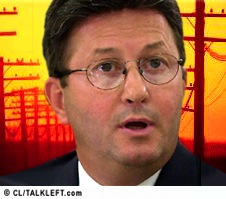Nacchio: Did U.S. Retaliate Because Qwest Refused to Comply With NSA Surveillance?

Looks like it's time for a trip to the courthouse tomorrow. The Judge in the insider trading trial of former Qwest CEO Joseph Nacchio has unsealed documents related to his classified information defense which he was not allowed to present at trial. This is coming up now because yesterday Joe Nacchio filed his appeal brief and one of the grounds alleges the Judge erred in refusing him to raise his classfied secrets defense.
The Rocky Mountain News reports:
The National Security Agency and other government agencies retaliated against Qwest because the Denver telco refused to go along with a phone spying program, documents released Wednesday suggest.
The documents indicate that likely would have been at the heart of former CEO Joe Nacchio's so-called "classified information" defense at his insider trading trial, had he been allowed to present it.
More...
| < Obama's Latest Criticism of Hillary Over Kyl- Lieberman Amendment | Cuba Begins Returning U.S. Fugitives > |



